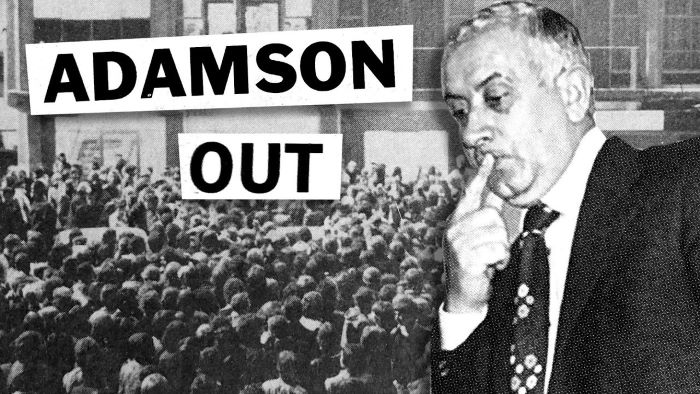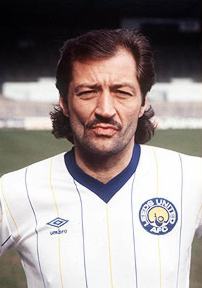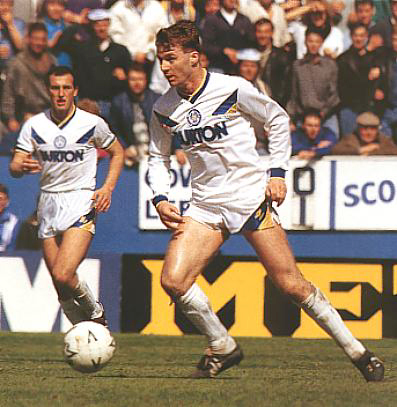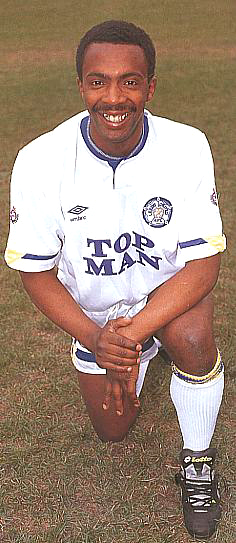 |
 |
 |
Jimmy Adamson professed himself to be more disappointed than anybody
when Tony Currie left United fans never took to Adamson and soon started making their disaffection
apparent. Paul Madeley made his 500th League appearance at the end of September,
but that apart it was an uneventful campaign with a ninth place finish.
The team struggled before Christmas; a run of a single victory from the
first eight games resulted in Adamson being given two months to get things
back on track. Good form at Elland Road was the basis of a turnaround
which saw the club rise to eleventh and kept the manager safe. Leeds were poor in knockout football, losing 7-0 to Arsenal in the League
Cup and 4-1 to Forest in the FA Cup. The UEFA Cup campaign was also disappointing
and United lost both legs of their second round tie against Romania's
Universitatea Craiova. The supporters, yearning for better things, deserted in their thousands
as an air of despondency descended on the club. There was some hope for
the future as a number of home grown youngsters broke through - Byron
Stevenson, John Lukic, Terry Connor and Martin Dickinson brought hopes
of a revival. Adamson splashed out £400,000 on Sheffield United's gifted Argentinian
schemer Alex Sabella, recovering £175,000 by selling Peter Hampton to
Stoke City. But there was no revival as the Whites secured one victory
from the first eleven games and Adamson was shown the door long before
that run came to an end. Maurice Lindley took the reins for a brief spell
before former striker Allan Clarke was given the opportunity to revive
the club's fortunes after impressing as Barnsley manager. Clarke promised to win silverware inside three years and his first game,
at Elland Road against Manchester United, saw him given a hero's welcome
as United fought out a 0-0 draw. Paul Madeley sustained an injury in a dispiriting 5-0 defeat to Arsenal
on 8 November and it proved to be his final appearance for a club to which
he had been such a loyal servant. Clarke wrote in the following week's programme: 'I have never believed
in looking for excuses or trying to whitewash over a poor performance
and I think all of you who were here on Saturday will agree that on the
day Arsenal looked five goals better than we did. We held a full and frank
inquest into the game on Sunday morning when all the players reported
to the ground. The pride of each and every one of us was deeply hurt on
Saturday and if there was a Leeds player who did not feel some humiliation,
then there's no place for that man at Elland Road.' In his autobiography, Clarke wrote: 'We began well by drawing against
Manchester United, but then got thrashed at Sunderland. The following
week during training our left back Byron Stevenson picked up an injury.
I asked Eddie Gray to deputise in a twenty minute practice match. He was
a revelation. I played him against Ipswich and he kept his place for the
rest of the season. Eddie was brilliant in tandem with Arthur Graham and
was by far the best left-back in the League. This decision extended his
playing career by three seasons. 'We slowly moved up the table with a system that wasn't the prettiest
to watch, but suited the players. Towards the end of the season, Ipswich
came to Elland Road as League leaders. They strolled into the ground with
an attitude that they would win comfortably, and played as if they'd already
taken the title. We won 3-0. I knew we were on the right lines and looked
to strengthen the team.' Determined defensive displays became a habit as Clarke sought to ensure
his team would survive and gradually they stabilised, ending the season
ninth. Victory over Manchester United at Old Trafford at the end of February
gave the fans hopes of better things to come; their hopes were boosted
by Clarke's transfer dealings as he signed England winger Peter Barnes
from West Bromwich Albion for £930,000 and brought old favourite Frank
Gray home from Nottingham Forest in a £300,000 deal. There was to be no new dawn, and an opening day 5-1 thrashing at promoted
Swansea set the tone for a depressing campaign. A hat trick by Arthur
Graham brought a 3-0 victory against Wolves on 5 September, but that was
the only win in the first ten league games, which yielded just four other
goals. The Football League had introduced three points for a win in an attempt
to incentivise attacking football, but United's victories were few and
far between; the £400,000 purchase of Kenny Burns from Forest brought
some defensive steel but he found himself in a poor side. In desperate
search of goals Clarke traded Byron Stevenson for Birmingham City striker
Frank Worthington. United beat Brighton 2-1 in the final home game to climb out of the relegation
zone. They needed just a point at rivals West Bromwich Albion the following
Monday, but lost 2-0 to join Wolves and Middlesbrough in the drop. Disgruntled
supporters rioted after the game and United ended their 18-year stay in
the top flight in disgrace, with Clarke and his assistant Martin Wilkinson
paying the price with their jobs. Clarke recalls his demise: 'My major headache was Peter Barnes. On his
day he could be brilliant, however the game was changing and part of his
role was to help out in defence, but he rarely did. During the season
I dropped him. The Board then interfered and demanded I play him, but
I refused till he justified his place. I brought him back for the run-in,
but I was still unhappy. I told the Board certain players had to go. Manny
told me he'd heard there was unrest in the dressing room, but would not
co-operate. At that moment my time at Leeds was over; the Board had lost
faith in me. Although we occasionally rallied, it was touch and go whether
we'd survive. 'Our only hope of avoiding relegation was if West Brom beat Stoke in
their last game. I went to the match. I should have stayed at home - only
Derek Statham tried, the rest might as well have sat in the stand with
me. I was devastated. 'A few days later I was due to go on holiday. I was summoned to a Board
meeting and told it would be taken badly if I didn't attend. I was mentally
shattered and needed a rest. I missed the meeting. After returning from
Portugal I went to the next Board meeting. We discussed where things had
gone wrong. I told them it all stemmed from the time I got no backing
over troublesome players. I was handed a list of conditions I would have
to work under during the next campaign. I knew my days were over at Leeds,
which saddened me because I loved the club. The next day I met Manny Cussins
and we sorted out matters amicably. 'Looking back, I still believe that if the Board had taken a longer-term
view things may have been different. I was always a firm believer in a
youth policy and in the short period I was at the club a number of players
showed tremendous promise. Apprentices who went on to have fine careers
included David Seaman, Denis Irwin, Scott Sellars, Terry Phelan, Neil
Aspin, John Sheridan and Tommy Wright. 'My time as manager of Leeds United was very disappointing, but I'm pleased
I had the chance … I'm only sorry I wasn't given the opportunity to try
getting them back into the First Division.' The board replaced Clarke from within, appointing Eddie Gray player-manager. They handed Gray a poison chalice with the club's debt well north of
£1.5m. In a desperate attempt to trim an unsustainable wage bill Gray
loaned out Peter Barnes to Real Betis and sold Welsh international winger
Carl Harris to Charlton for £100,000. To add to the financial woes, a hooligan element now dogged the club
and they wrecked Grimsby's Blundell Road ground on the opening day of
the 1982/83 season. Prompted by the threat of fines and ground closures,
United's directors used the programme for the Charlton game on 6 November
to warn that 'the mindless actions of a minority … have placed an enormous
degree of uncertainty over this great club … We would ask for the help
and co-operation of everyone … to help rid the club of the "scab" element
… whose loathsome actions now place the very existence of Leeds United
in jeopardy.' The FA ordered the closure of the terraces for two December fixtures
and demanded they be made all-ticket. The QPR fixture drew 11,528, the
lowest crowd for nineteen years, but Shrewsbury attracted just 8,741. United finished the season eighth, ten points shy of promotion. But there was youthful talent coming through the ranks and the potential
of 18-year-old midfielder John Sheridan was there for all to see. Gray
hitched his colours to the mast of youth; the sale of a number of big
name players cleared out the bloated wage bill and Gray re-signed former
team mate Peter Lorimer to help him nurture youngsters like Denis Irwin,
Neil Aspin, Scott Sellars and Tommy Wright. Understandably, the changes left the club open to erratic swings in form
and the 1983/84 campaign brought a struggle in the League and disgrace
in the Cups, with exits at the hands of Third Division Oxford and Allan
Clarke's Scunthorpe. Four straight opening victories gave cause for optimism the following
season but United lost the next three matches and were again plagued by
inconsistency, though they remained in with a promotion chance to the
end of the campaign, boosted by the signing of Southampton striker Ian
Baird, who scored six times in as many appearances. His goal was enough to beat Shrewsbury on 6 May, leaving United sixth
with one game remaining. Hopes were ended, however, by defeat at Birmingham
and Leeds fans clashed on the pitch with their rivals. The infamous 'Battle
of St Andrews' saw a wall collapse under the weight of numbers and a teenager
die in the trouble with the game halted During the summer of 1985, Eddie Gray sold brother Frank to Sunderland
to help balance the finances but five winless games, including a 6-2 defeat
at Stoke, lost him the confidence of the directors. Despite stabilising
matters with a six-match unbeaten run, Gray was dismissed after a Milk
Cup victory over Walsall on 8 October. The decision sparked unrest among players and supporters and, after a
protest in the stadium car park, director Brian Woodward broke ranks and
resigned. Peter Lorimer handed the Board a statement which roundly condemned
the handling and timing of the decision. The board tried to weather the storm by handing the job to beloved former
skipper Billy Bremner. The club was in turmoil with Elland Road sold to Leeds City Council for
£2.5m. Bremner sold Andy Linighan and Martin Dickinson to raise funds
for the purchase of Brendan Ormsby, David Rennie, Ronnie Robinson, Brian
Caswell and David Harle, but United spent the season battling against
relegation, despite the £200,000 signing of gifted Doncaster midfielder
Ian Snodin who took the captain's armband from Peter Lorimer. When United travelled to second-placed Portsmouth on 5 April they were
just five points and a couple of places above the drop zone with seven
games remaining. Pompey took a first half lead but Leeds fought back with
Andy Ritchie equalising, Ian Baird adding a second and Ritchie a third.
Pompey defender Noel Blake scored his second goal of the game to narrow
the margin but United held out to secure three precious points. Even three defeats from the final four games could not drag the club
into the mire and United finished the 1985/86 season seven points clear
of relegation. Bremner began to rebuild, shipping out Denis Irwin, Tommy Wright, Scott
Sellars, Terry Phelan, George McCluskey, Gary Hamson and David Harle.
He used the funds released to sign prolific Sheffield United striker Keith
Edwards for £125,000, along with Peter Haddock, Jack Ashurst, John Buckley,
Ronnie Sinclair and Russell Doig. In recognition of supporters' improved behaviour, the FA withdrew the
all-ticket sanction but the violence returned at Bradford City's Odsal
Stadium on 20 September. A fish and chip van was overturned and set on
fire during the game, which was held up for 20 minutes. The ground was
emptied and the match concluded in silence. When United suggested the
restoration of the all-ticket arrangements the FA were quick to agree
to the request. Bremner responded with sweeping changes to a crushing 7-2 defeat at Stoke
on 21 December. He sold Ian Snodin to Everton for a club record £840,000
and brought in Micky Adams, John Pearson, Bobby McDonald and Mark Aizlewood. The changes transformed the club's fortunes and United reached the FA
Cup semi-finals for the first time in a decade. The Hillsborough tie against First Division Coventry was a thrilling
encounter. United dominated the first twenty minutes and took the lead
after 15 minutes through David Rennie. Substitute Micky Gynn equalised
for the Sky Blues and then Keith Houchen gave them the lead with twelve
minutes remaining. Bremner brought Keith Edwards off the bench four minutes
later and he equalised to take the game into extra-time. Coventry's David
Bennett made it 3-2 in the first half of the extra thirty minutes to settle
one of the best semi-finals ever. United's Second Division form echoed their Cup success and they won five
of their final eight games to secure fourth spot and a place in the first
end-of-season Play-Offs, facing Oldham in a two-legged semi-final. United won 1-0 at Elland Road, but were 2-0 down with minutes to go in
the return until Edwards came off the bench to secure the away goal that
saw them through. United faced Charlton in a two-legged final. They lost 1-0 at the Valley
but matched the result at Elland Road to force a decider at St Andrews.
After the game reached ninety minutes without a goal, United took the
lead through a John Sheridan free kick in the first period of extra time
only for Peter Shirtliff to net twice for the Londoners in the closing
stages. It had nevertheless been a magnificent season and with United installed
as favourites to secure promotion, the directors extended Bremner's contract
as reward for his achievements. United struggled to live up to their billing and Bremner was forced into
the transfer market after a poor start. He turned to reserve defender
Peter Swan to lead the forward line for a while before bringing in £350,000
Derby striker Bobby Davison in November. The new man scored on his debut, in a 4-2 defeat of Swindon, and again
in good wins against Birmingham, Huddersfield and But the club drifted to a mediocre seventh and disillusioned supporters
had little to console them apart from the emergence of the tigerish Leeds-born
midfielder, David Batty. Bremner refreshed his squad in the 1988 close season, signing the Portsmouth
pair of centre-back Noel Blake and wide man Vince Hilaire but United lost
4-0 on the opening day at the pair's former club, with Ian Baird, another
ex-Pompey man, sent off. The Whites won just once in the next five League
games and Bremner paid the price with his job. It was essential that United found someone who could breathe new life
into the club. The appointment of Sheffield Wednesday manager Howard Wilkinson
surprised many with the Owls enjoying life in the top half of the First
Division. It took something special in terms of package, ambition and
promises of backing in the transfer market to persuade Wilkinson to agree
a four-year deal. The new man was ruthless: he intensified the players' training routines
to improve their fitness and ordered all photographs of the Revie era
to be removed from the stadium. He was quick to take the directors up on their promise of cash and signed
Bristol City striker Carl Shutt. There were concerns when the promising
Bob Taylor took the reverse trip to Bristol, but the fans were won over
when Shutt scored a hat trick on his debut. Leeds were second bottom with six points from nine games when Wilko arrived
but survival was assured with games to spare and they finished tenth. Wilkinson surprised many by signing Scottish international midfielder
Gordon Strachan from Manchester United. Strachan was considered a spent
force but Wilkinson saw a leader who could inspire his new team and was
rewarded for his faith when Strachan led a stupendous revival, much as
Bobby Collins had done three decades earlier. Wilkinson raised £1.5m from the sale of John Sheridan, Mark Aizlewood,
Neil Aspin, David Rennie, John Stiles, Kevin Noteman, Peter Mumby, Ronnie
Sinclair and Gary Williams. He re-invested the money and much more, signing
Vinnie Jones, Chris Fairclough, John Hendrie, Mel Sterland, John McClelland,
Mickey Thomas and Jim Beglin. The sale of Aizlewood came as no surprise; Wilkinson had been appalled
when the player gestured angrily at United supporters when they barracked
him. The new manager was a strict disciplinarian and would not tolerate
such behaviour. There was more disquiet about the departure of Sheridan
and many questioned the sanity of bringing in the loose cannon that was
Wimbledon hard man Vinnie Jones. Leeds
United in August 1979, insisting that the midfielder had to move to a
London club for domestic reasons and that it was only right to respect
that request.
Leeds
United in August 1979, insisting that the midfielder had to move to a
London club for domestic reasons and that it was only right to respect
that request. The
former England man returned nine goals in his seventeen appearances but
there were too many dropped points.
The
former England man returned nine goals in his seventeen appearances but
there were too many dropped points. for
thirty minutes and ninety-six policemen injured. United were fined £5,000
and their games the following season made all-ticket.
for
thirty minutes and ninety-six policemen injured. United were fined £5,000
and their games the following season made all-ticket. Middlesbrough prior to Christmas.
Middlesbrough prior to Christmas.